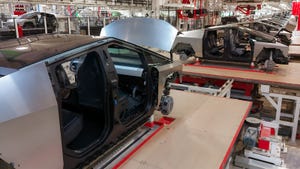A battery-industry scientist and entrepreneur says battery management systems today are nearly good enough and that the industry should instead look to cloud analytics for innovation.
June 28, 2022

A decade-long career and an extensive background in academia have allowed Dr. Kai-Philipp Kairies to make a significant impact on the industry. In previous roles as a battery researcher and consultant in places including Germany, Singapore, and California, Dr. Kai-Phillip Kairies has gained extensive experience in the field of innovative storage solutions.
Now, his newest role is as CEO of ACCURE, Battery Intelligence GmbH, a research-led startup that supports companies in understanding and improving their battery safety and longevity using advanced data analytics. Battery Technology asked Dr. Kai-Phillip Kairies his thoughts on the state of the field and the role that data-driven battery technology will play in the future. You can also hear him speak at the Battery Show Europe.
Why are concerns over Li-Ion battery capacity, safety, and lifespan more important today than ever before?
To win the “race to zero emissions” lithium-ion batteries play an essential role to store renewable energy and to power our mobility. Our common zero emissions target goes hand-in-hand to advance battery safety, performance, and lifetime.
From an environmental aspect, we need to use the batteries we have today more efficiently which is also important in terms of raw material shortage and saving resources. Battery data can tell how the charging cycles and other usage factors affect the lifetime and performance, revealing how to improve it.
All in all, we need to spread the word that safe, reliable, and sustainable batteries are possible and the backbone of our energy future.
What is the role of a battery management system in lithium-ion-based electronics?
Battery management systems (BMS) monitor all cells within a battery pack and use balancing to limit divergence between individual cells. They also estimate the state of charge (SOC), which is used to determine the range of a car or how long you can continue to use your notebook. It also comes with basic safety features, such as a protection against overheating or deep discharging which can be seen as a last defense to battery failure.
BMS does not recognize when cells behave only slightly irregularly and hence cannot inform the operator before they become dangerous. One reason for this is their limited access to data: They can neither see their own past nor the behavior of the millions of similar battery packs that define the baseline for all advanced diagnostics. This also leads to substantial limitations when it comes to forecasting the state of health or predicting the residual value of a battery.
So while BMS generate all the data needed to do advanced analysis, they are not able to do them locally. That’s why I believe that to effectively operate your batteries and successfully prevent fires and unexpected breakdowns you need an added layer of safety before the last defense.
ACCURE focuses on battery intelligence innovations. What does this mean, and how do advanced data analytics contribute to this?
Batteries generate vast amounts of data over their lifecycle. Most of this data is currently not being used because BMS is not designed to “translate” these data into actionable insights, forecasts, and predictions.
With a “translation program” like our ACCURE Cloud we are able to apply our algorithms and database knowledge from the behavior of millions of battery cells and finally, provide “intelligence” to battery operators that goes far beyond what BMS can do. This way we make really transparent what is happening inside a battery – without performing costly and time-intensive lab testing or any additional hardware and modifications of the battery system. The “intelligence” is purely based on operational data which are already available.
Once we have the data from the BMS in our ACCURE Cloud, it gets cleaned and made available in a structured way. The goal of data cleansing is to manage complexity, unify formats, and find and (if possible) correct measurement errors. We use machine learning on one hand and our battery expert’s knowledge on the other hand to prepare the data for our “battery magic”.
After this, we can build battery models (some call them digital twins) of the batteries. By extracting features like open-circuit voltages, loss of lithium inventory, and complex impedances from the field data, these digital twins allow us, among other things, to detect anomalies with a potential to lead to incidents like battery fires, predict future performance and aging and optimize operation.
We apply these algorithms to batteries in a wide variety of applications, from micro-mobility and electric buses to sportscars, ships, and large-scale energy storage facilities. Our advanced analytics also help determine the value of retired EV batteries to find suitable 2nd life applications for them.
How can the industry leverage advances in battery management systems and advanced analytics to ensure greater safety?
The battery industry is one of the fastest moving industries in the world right now – from patents being filed to venture capital to workforce growth.
The ever-increasing demand for higher energy densities and longer lifetime drive innovations on all fronts, from cell chemistry to pack design, BMS, and cloud analytics. Personally, I do not believe that BMS need to become much better than they are today. Additional data points such as ultrasound or online EIS would be extremely cool to have, but they don’t seem to become commercially viable any time soon. In the meantime, I believe that cloud analytics is a fantastic solution to apply right now.
You are the CEO of ACCURE Battery Intelligence. What are the company's primary focus and goals?
Our vision is to improve the safety, performance, and sustainability of every battery in the world using cloud computing. That is what we all at ACCURE are working for.
What is the most exciting emerging battery technology in your opinion?
I believe that sodium-ion batteries have a high potential for large-scale success, as they share many production techniques with lithium-ion batteries but rely on different raw materials. Their comparably lower energy density is acceptable in many applications, from stationary storage systems to entry-level cars. We have not seen commercial cells achieve the required lifetimes to really win these categories, but this probably can be sorted out over time. With spiking prices for lithium hydroxide on the one hand and industry giants like CATL backing sodium-ion technology on the other hand, I believe that there are good chances for a large-scale commercialization of this technology.
Any advice for young engineers hoping to stake out a career in batteries and energy storage?
I studied electrical engineering at RWTH Aachen, one of the premier tech universities in Germany. And for the large part, it was one of the most frustrating experiences in my life. It was just so hard and abstract. In my second year, I seriously considered dropping out and pursuing a different career when I — by chance — ended up in a lecture that was given by a new junior professor. The professor was Dirk Uwe Sauer, and his lecture was about batteries and how they will change everything we know about energy and mobility. I was completely hooked and applied for a job as a student assistant at his chair the same week. Getting through “boring” classes like math, physics and material science was still hard, but much easier than ever before.
So, my advice to young engineers is really: Keep your eyes on the target and power through, even if the road is bumpy sometimes. We need every single one of you to make the energy and mobility transition successful and (I’m obviously biased here) working on batteries it’s one of the coolest jobs on the planet!
About the Author(s)
You May Also Like





